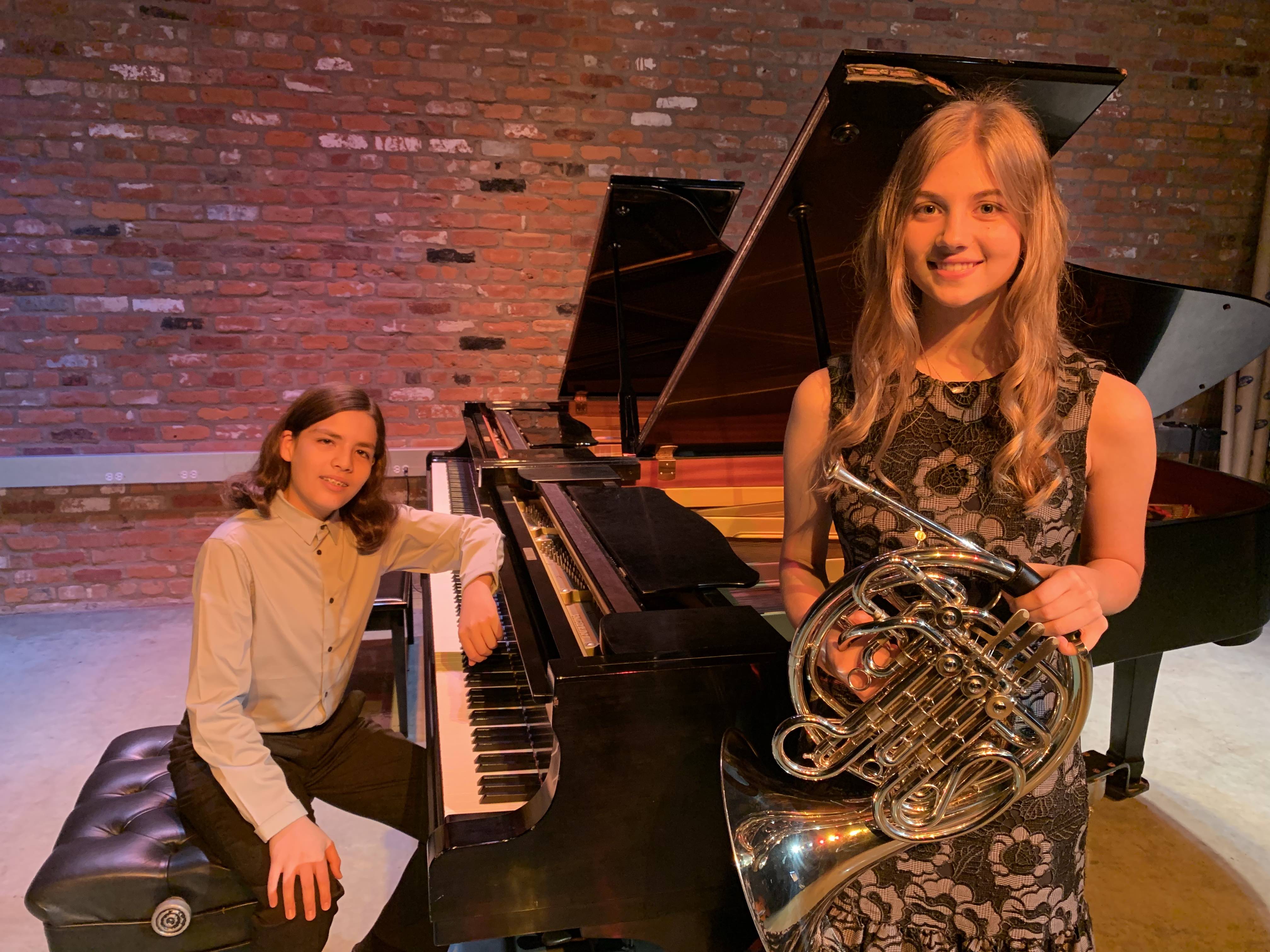
Students currently in 6th-7th grades may apply for Middle School Arts Instruction.
Students currently in 8th-11th grades may apply for High School Arts Instruction.
The Classical Instrumental program offers extensive pre-professional training to intermediate and advanced instrumental students in Piano, Strings, Brass, Winds, and Guitar. Instruction will focus on areas such as exploration of the standard repertoire, chamber music, theory, musicianship/ear training, as well as scales, etudes, and accompaniment.
It is strongly recommended that all students first attend the NOCCA Classical Instrumental Audition Information Session before attempting the official NOCCA Classical Instrumental Audition. In order to have the necessary skills required to pass the NOCCA audition, students should have been taking individual music instrumental lessons (one-on-one) for at least one full year with a professional and qualified classical instructor that is a specialist for their instrument.
Video Audition (Pre-Screening Round)
Video Recording Requirements: For the first, pre-screening round of the audition any student applying for any instrument will need to submit a continuous unedited performance video. Videos must not be filmed more than two weeks prior to submission. Video recordings must be unedited and continuous (may not be cut or paused between each repertoire selection and the scales). Videos taken by cell phones and other non-professional video devices are acceptable. Selected students will be invited to the Live In-Person Audition Round at NOCCA.
Repertoire Requirements: Any applicant applying for any instrument will need to submit (1) two *contrasting pieces, such as a movement of a Sonata, Sonatina, Concerto, Two-part Invention, Etude, Characteristic Piece, etc., and (2) two major or minor scales. It is recommended that the audition pieces best demonstrate the student’s ability to play in both technical and lyrical styles. Scales for all instruments must be performed from memory. Please see below for specific requirements concerning each instrument/area.
*"Contrasting" refers to two different time periods (i.e. Baroque, Classical, Romantic, Impressionistic, Contemporary). In order to show different types of skills (technical, musical, etc.), students may choose one fast and one slow piece, but that is not a requirement and what is meant with “contrasting." Students should not play two pieces by the same composer or two movements of the same piece.
Instruments:
Classical Piano: Perform (1) two contrasting pieces (see definition of contrasting above) from memory that best demonstrate student’s good sound, technique, sense of rhythm, expression, and overall musicality; and (2) two scales of their own choosing and be able to perform them in a speed that is allowing the student to demonstrate evenness, good articulation, and correct fingering. It is highly recommended (but not mandatory) that the student is able to perform the scales in two to four octaves and hands together. Students should record all the required materials on a piano (preferably acoustic, electric/digital is acceptable if needed). The video must be filmed with both the pianist’s face and hands in the frame at all times.
Classical Strings (Violin, Viola, Cello, Double Bass): Perform (1) two contrasting pieces from memory; and (2) two scales of their own choosing. High School applicants are recommended that the scales are performed in three octaves for Violin, Viola and Cello and in two octaves for Bass, and include one major and one melodic minor scale.
Classical Guitar: Classical Guitar applicants will need to (1) demonstrate proper sitting position with a footstool showcasing good posture and left and right-hand position and function of the fingers as referenced in Pumping Nylon by Scott Tennant. (2) Perform two contrasting pieces from memory (see definition of contrasting above), such as a movement of a Sonata, Sonatina, Concerto, stand-alone piece, or Etude that demonstrate good sound technique, good sense of rhythm, expression, and overall musicality. (3) Demonstrate two-octave major scales (Segovia C-major moveable pattern) from 1st to 7th position and a first position chromatic scale on all six strings—alternation of index and middle fingers from the big knuckle should be evident.
Classical Woodwinds (Flute, Oboe, Clarinet, Bassoon, Saxophone), and Classical Brass (French Horn, Trumpet, Trombone, Euphonium, Tuba): Students will need to prepare to perform (1) two contrasting pieces (see definition of contrasting above). Selected works may be chosen from standard works for the instrument (individual movements from a Concerto, Sonata, Etude or other solo work). Selections cannot be excerpts or individual parts from band or orchestra works. Audition pieces should best demonstrate the student’s ability to play in both technical and lyrical styles. It is recommended (but not mandatory) that at least one of the selected pieces is performed from memory. (2) In addition, applicants must prepare two major scales of their own choosing (one or two octaves). Scales must be performed from memory. (3) Applicants should demonstrate proper posture and hand position for their instrument.
Selected applicants from the first Video Pre-Screening Round will be invited to the second In-Person Audition Round at NOCCA.
In-Person Audition Round at NOCCA (by invitation only)
Students will be asked to perform live, in front of the Classical Instrumental faculty, both of the pieces they have submitted for the first (Video Pre-Screening) round, and to perform scales and demonstrate skills in sight-reading music. Students should be able to discuss their grades and express a strong self-drive and motivation to advance in their art form. Students may also be given a written test in elemental music theory, so that they are placed at the most suitable theory level should they be accepted at the Classical Instrumental Program at NOCCA.
In addition to individual department requirements, all applicants will:
-
- Upload to the application a 1-2 minute video of the applicant answering the question, “Why do I want to train at NOCCA?"
- Upload to the application a copy of the most recent report card. Applicants must have at least a 2.0 GPA.
- Be prepared with the email of an adult who is not related to you to complete your recommendation. Your recommender will receive an email from Acceptd with a link to fill out a recommendation form online.
Faculty

Dr. Leslie Cain
Music Theory, Ear Training, Accompanist MusicBiography
Pianist Leslie Cain, D.M.A., has been widely praised for her delicate touch and nuanced sense of color at the keyboard. Born and raised in Los Angeles, she completed her Bachelor’s degree at the Manhattan School of Music, where she studied with André-Michel Schub. She subsequently earned her Master’s and Doctoral degrees from the University of California, Santa Barbara in the studio of Paul Berkowitz. Prior to attending conservatory, she completed an undergraduate degree in Philosophy from California State University, Los Angeles, where she was named the department’s Outstanding Undergraduate in her junior year.
Dr. Cain’s primary interest as a pianist and scholar is the French repertoire of the early 20th century, especially Maurice Ravel, Claude Debussy, and Erik Satie. Her doctoral dissertation, “Ravel the Existentialist?,” reconciles the two disciplines of her academic background by analyzing the composer’s life and work using the philosophy of Jean-Paul Sartre as a conceptual and historical lens. She is also an alumna of the Conservatoire Américain de Fontainebleau, the renowned institute of French music held each summer at Napoleon Bonaparte’s château.
Dr. Cain has performed in master classes with many of the world’s foremost musicians, including Murray Perahia, Jeremy Denk, Gilbert Kalish, Yo-Yo Ma and the Kronos Quartet. She was one of six pianists selected to perform in Richard Goode’s master class on the Debussy preludes at Carnegie Hall, by invitation of the Weill Music Institute. Her other recognitions include first prizes in the Los Angeles International Liszt Competition, the MTNA Senior Piano Competition, and the Cypress College Piano Competition, as well as concerto performances with several orchestras throughout Southern California. During her doctoral studies, she was a member of UC Santa Barbara’s fellowship ensemble, the Young Artist Piano Quartet, and especially enjoys collaborating with string players as a chamber musician.
Besides playing and teaching music, a few of Dr. Cain’s favorite things include her tortoiseshell cat Ouija, lavender lattes, the New Orleans Spooky Book Club, and, when assuming her not-so-secret identity as a fitness instructor, teaching classes for Barre3.
http://www.leslieedithcain.com
